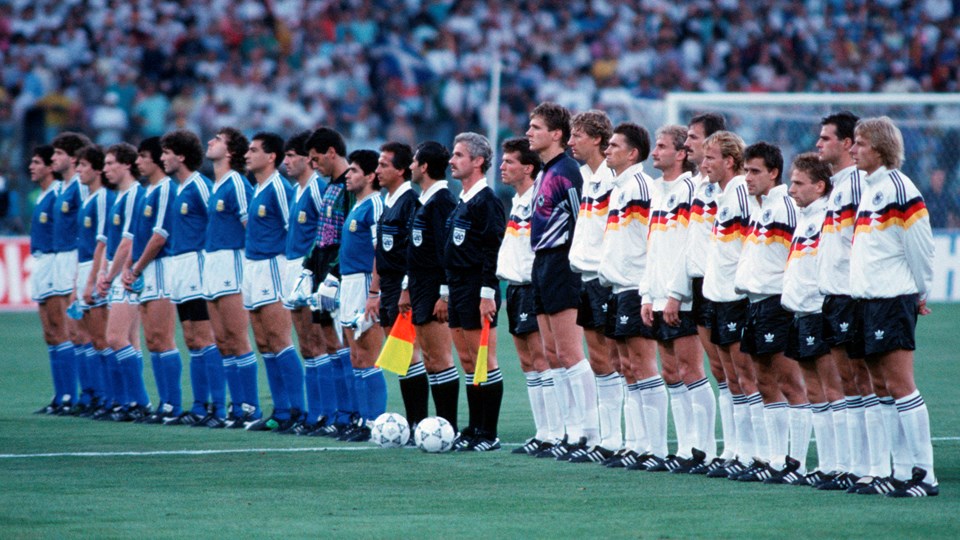The 1990 World Cup was touted as the worst World Cup in history. However, that’s where the world football revolution begins.
The tournament which is held every four years often attracts the attention of the world community. Its popularity even beat the Olympics which brought together around 200 contingents in the world.
However, like everything else, there are the best and the worst. The World Cup too. Although this tournament always presents world-class stars and guarantees surprises, not infrequently it also provides unpleasant stories. For example the incident of Zinedine Zidane’s header to Marco Materazzi which led to a red card in the 2006 World Cup final match. The incident was also a marker of the end of his career.
If the 2006 World Cup leaves a story of a dispute between Zinedine Zidane and Marco Materazzi, then another case with the 1990 World Cup. Held in Italy, this World Cup is remembered as the worst in history. This has something to do with Italian catenaccio.
The 1990 World Cup only recorded 115 goals throughout the tournament or an average of 2.21 goals in each match. The average goal is the lowest in World Cup history. Lack of goals in the group phase, the two semi-final matches which continued into the penalty round were highlighted by the rise of negative tactics used by participating countries. The peak, occurred in the 1990 World Cup final which brought together West Germany (now Germany) and Argentina.
Germany and Argentina have a long history in their competition in world football. Therefore, this fight is predicted to be the perfect cover for the 1990 World Cup. However, audience expectations are not met.
The match ended for West Germany’s victory over Argentina with a score of 1-0. However, this match was recorded as the worst final at the World Cup. Not the rain of goals they witnessed, but the rain of violations and cards. In addition, Argentina also applied negative tactics in this match. They only recorded one shot. While Germany fired 16 shots on target from 23 shots.
Goals from the spot point Andreas Brehme in the 85th minute became a differentiator. However, the process towards the goal was colored by various controversial violations.
Argentina itself must lose two players in this fight. Pedro Monzon became the first player in World Cup history to be red carded in the final. The negative tactics applied by Argentina also made them the first country not to score in the World Cup final.
Argentina finally had to bite the finger in the final round. Negative tactics applied to force penalties to fail miserably. They also lost two players in this match. Argentina also missed through a controversial German penalty which was won after Rudi Voller was violated by Roberto Sensini.
After the match, the referee, Edgardo Codesal (Mexico), was targeted by Argentine players because he thought he “helped” the Germans win. They protested the penalty decision for Germany. Nevertheless, the referee remained unmoved and the results still showed Germany won the World Cup for the third time.
Franz Beckenbauer, who coached West Germany at the time, successfully made a record as a coach and the second player to win the World Cup (with Mario Zagallo). More special because Beckenbauer was the only player to win the World Cup while serving as captain for his country.
Beckenbauer then regretted the negative game of Argentina, which he said was the reason his team had difficulty scoring goals despite being very dominant.
“We could have continued to play patiently. We could have scored at least throughout the game. However, we played full 90 minutes and I regretted that Argentina didn’t give us anything [resistance]. It felt like it wasn’t an official match. They tried to destroy this match. “But you can’t choose your opponent,” he said, quoted by The New York Times.
The 1990 World Cup made FIFA make a number of basic changes to the quality of a better soccer match. One of them is by changing the number of points of victory to three points (from two points). This is intended to increase the spirit of competition between countries that compete in winning full points.
In addition, FIFA also applies backpass rules to avoid time-consuming tricks and ward off negative football. At the World Cup, many teams deliberately linger in control of the ball if they have difficulty attacking their opponents, one of them being Argentina. As a result, returning the ball to the goalkeeper is their solution.
The match went boring because they chose ‘play safe’. Back pass rules apply if the goalkeeper receives the ball using an intentional kick from his partner without being controlled first or immediately receiving a throw-in from his partner; just like te
















